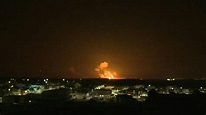Featured
article
- Get link
- X
- Other Apps
Diplomacy on Hold: Iran Rejects Nuclear Talks Amid Escalating Conflict

As tensions between Iran and Israel intensify, Tehran has firmly ruled out any negotiations over its nuclear program while under military assault. Iranian Foreign Minister Abbas Araqchi declared that talks with the United States—Israel’s key ally—are off the table until Israeli aggression ceases.
The conflict, now entering its second week, has seen Israel launch strikes on dozens of Iranian military targets, including missile production facilities and nuclear research centers in Tehran. Iran has responded with missile barrages, some landing near civilian infrastructure in Beersheba, southern Israel.
President Donald Trump, meanwhile, is weighing U.S. involvement. The White House stated he will decide within two weeks whether to intervene militarily or pursue diplomatic channels. European diplomats are scrambling to salvage dialogue, with a meeting in Geneva aimed at coaxing Iran back to the negotiating table. However, expectations for progress remain low.
Both nations claim to be targeting military assets, but civilian casualties are mounting. Human rights groups report over 600 deaths in Iran, including top military officials and nuclear scientists, while Israel has suffered at least two dozen civilian fatalities.
With diplomacy frozen and the threat of broader conflict looming, the international community watches anxiously for signs of de-escalation.
Popular Posts
Midnight Blast Shakes Gaza Skyline Amid Rising Tensions
- Get link
- X
- Other Apps
Trump's Six Words: "I'm Going to Stop the Wars"
- Get link
- X
- Other Apps



Comments
Post a Comment